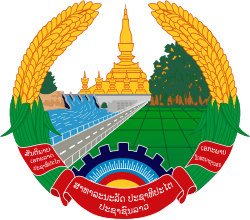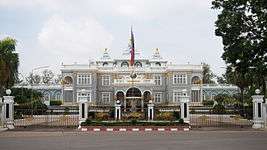Politics of Laos
The politics of the Lao People's Democratic Republic (commonly known as Laos) takes place in the framework of a one-party socialist republic. The only legal political party is the Lao People's Revolutionary Party (LPRP).[1] The de jure head of state is President Bounnhang Vorachith, who also is LPRP general secretary making him the de facto leader of Laos.
 |
|---|
| This article is part of a series on the politics and government of the Lao People's Democratic Republic |
|
Ideology |
| Constitution |
|
|
Legislature
|
|
Executive
|
|
Mass organizations
|
|
|
|
|
The head of government is Prime Minister Thongloun Sisoulith. Government policies are determined by the party through the all-powerful nine-member Politburo and the 49-member Central Committee. Important government decisions are vetted by the Council of Ministers.
The FY 2000 central government budget plan called for revenue of $180 million and expenditures of $289 million, including capital expenditures of $202 million.
Political culture
Laos' first, French-written and monarchical constitution was promulgated on May 11, 1947 and declared it to be an independent state within the French Union. The revised constitution of May 11, 1957, omitted reference to the French Union, though close educational, health and technical ties with the former colonial power persisted. The 1957 document was abrogated on December 3, 1975, when a communist state was proclaimed.
A new constitution was adopted in 1991 and enshrined a "leading role" for the LPRP. The following year, elections were held for a new 85-seat National Assembly with members elected by secret ballot to five-year terms. This National Assembly, which essentially acts as a rubber stamp for the LPRP, approves all new laws, although the executive branch retains authority to issue binding decrees.
The most recent election took place in March 2016.
Insurgency
In the early 2000s, bomb attacks against the government occurred, coupled with small exchanges of fire, across Laos.[2] A variety of different groups have claimed responsibility including the Committee for Independence and Democracy in Laos and Lao Citizens Movement for Democracy.
Executive branch

| Office | Name | Party | Since |
|---|---|---|---|
| President | Bounnhang Vorachith | Lao People's Revolutionary Party | 20 April 2016 |
| Prime Minister | Thongloun Sisoulith | Lao People's Revolutionary Party | 20 April 2016 |
The president is elected by the National Assembly for a five-year term. The prime minister and the Council of Ministers are appointed by the president with the approval of the National Assembly for a five-year term.
There are also four deputy prime ministers. As of a cabinet reshuffle on June 8, 2006, they are Maj. Gen. Douangchay Phichit (also defense minister), Thongloun Sisoulith (also foreign minister), Somsavat Lengsavad and Maj. Gen. Asang Laoly.
The 28-member cabinet also includes Onechanh Thammavong as labour minister, Chaleuan Yapaoher as justice minister, Nam Vignaket as industry and commerce minister, Sitaheng Latsaphone as agriculture minister and Sommath Pholsena as transport minister.
Legislative branch
The National Assembly (Sapha Heng Xat) has 149 members (144 are LPRP, 5 independents), elected for a five-year term.
Political parties and elections
Parliamentary elections
| Alliance | Party | Votes | % | Seats | +/– |
|---|---|---|---|---|---|
| Lao Front for National Construction | Lao People's Revolutionary Party | 100 | 144 | +16 | |
| Independents | 5 | +1 | |||
| Invalid/blank votes | – | – | – | ||
| Total | 3,657,026 | 100 | 149 | +17 | |
| Registered voters/turnout | 3,733,932 | 97.94 | – | – | |
| Source: IPU | |||||
| Office | Name | Party | Since |
|---|---|---|---|
| General Secretary | Bounnhang Vorachith | Lao People's Revolutionary Party | 22 January 2016 |
Judicial branch
The President of the People's Supreme Court is elected by the National Assembly on the recommendation of the National Assembly Standing Committee. The Vice President of the People's Supreme Court and the judges are appointed by the National Assembly Standing Committee.
As for the legal profession, there are 188 lawyers in Laos who are members of the Laos Bar Association according to a 2016 article. However, most of the attorneys have entered the government sector and do not practice law—seldom giving thought to practicing in the private sector.[3] While there is evidence of female lawyers in Laos, there is no indication as to how women have fared in the legal field.
Government
- Agriculture and Forestry Lien Thikeo
- Education and Sports Sengdeuan Lachanthaboun
- Energy and Mines Khammany Inthilath
- Finance Lien Thikeo
- Foreign Affairs Saleumxay Kommasith
- Home Affairs (Interior) Khammanh Sounvileuth
- Industry and Commerce Khemmani Pholsena
.jpg)
- Information, Culture and Tourism Bosengkham Vongdara
- Justice Saysi Santhivong
- Labour and Social Welfare Khampheng Saysompheng
- Minister of Post, Telecom and Communications Thansamay Kommasith
- National Defense Chansamone Chanyalath
- Natural Resources and Environment Sommath Pholsena
- Planning and Investment Souphanh Keomixay
- Ministry of Health Bounkong Syhavong
- Public Security Brigadier General Somkeo Silavong
- Public Works and Transport Bounchanh Sinthavong
- Science and Technology Boviengkham Vongdara
Presidential Palace Office
- Phongsavath Boupha, Minister to Presidential Palace's Office
PM Office
- Sonxay Siphandone, Minister to the Prime Minister's Office, Head of the government Secretariat committee
- Bounpheng Mounphosay, Minister to Prime Minister's Office, Head the Public Administration and Civil Service Authority (PACSA)
- Bounheuang Douangphachanh, Minister to the Prime Minister's office, Chairman of the National Steering Committee for Rural Development and Poverty Reduction
- Dr Douangsavath Souphanouvong, Minister to Prime Minister's Office
- Dr Bounteim Phitsamai, Minister to Prime Minister's Office
- Khempheng Pholsena, Minister to Prime Minister's Office
- Phupeth Khamphounvong, Minister to the Prime Minister's Office
Somphao Phaysith, Governor of Lao PDR Central Bank
National Assembly (April 2016)
- President of the National Assembly: Pany Yathotou (re-elected)
- Vice-President of the National Assembly: Somphanh Phengkhammy (re-elected), Sengnouan Sayalath, Bounpone Bouttanavong and Sisay Leudethmounsone
People's Supreme Court
- President of People's Supreme Court: Khamphanh Sithidampha
- Supreme People's Prosecutor: Khamsane Souvong
Politburo of the Lao People's Revolutionary Party:
- Lt. Gen. Choummaly Sayasone, General Secretary of the Lao People's Revolutionary Party
- Thongsing Thammavong, Prime Minister (since 23 December 2010)
- Colonel Bounnhang Vorachith, Vice President of Lao People's Democratic Republic, Standing Member of the Secretariat
- Pany Yathotou, Chairwoman of the National Assembly (since 23 December 2010)
- Dr Thongloun Sisoulith, Deputy Prime Minister, Minister of Foreign Affairs, Head of the Party's National External Relations Committee
- Maj. Gen. Asang Laoly, Deputy Prime Minister
- Lt. Gen. Douangchay Phichith, Deputy Prime Minister, Minister of National Defence (died in 2014)
- Somsavat Lengsavad, Deputy Prime Minister
- Dr. Bounthong Chitmany, Chairman of the Party Central Committee's Commission for Inspection, Chairman of the State Inspection Committee.
- Dr Bounpone Bouttanavong, Deputy Prime Minister
- Dr. Phankham Viphavanh, Deputy Prime Minister, Minister of Education and Sports
Secretariat of the Party Central Committee:
- Lt. Gen. Choummaly Sayasone
- Bounnhang Vorachit (PCC Standing Secretariat)
- Dr Bounthong Chitmany, Chairman of the Commission for Inspection, Chairman of the State Inspection Committee
- Dr Bounpone Bouttanavong, Head of Lao Party Central Office, Deputy Prime Minister
- Dr Thongban Seng-aphone, Minister of Public Security (died in 2014)
- Chansy Phosikham, Head of the Party's Central Organisation Commission
- Soukan Mahalath, Secretary of the Vientiane City Party Committee, Vientiane Mayor (died in 2014)
- Lt. Gen. Sengnuan Xayalath, Acting Minister of National Defense (June 2014)
- Cheuang Sombounkhanh, Head of the Central Propaganda and Training Commission (died in 2014)
Inspection Committee of the Party Central Committee
- Bounthong Chitmany (President)
- Thongsy Ouanlasy
- Sinay Mienglavanh
- Khamsuan Chanthavong
- Thongsouk Bounyavong
- Singphet Bounsavatthiphan
- Bounpone Sangsomsak
Party Central Committee Advisor: Khamtai Siphandon
Administrative divisions
Laos is divided into 17 provinces (khoueng, singular and plural), 1 municipality* ( nakhon luang vientiane, singular and plural):
Attapu, Bokeo, Borikhamxay, Champassack, Houaphan, Khammouane, Louang Namtha, Luangphabang, Oudomxay, Phongsaly, Saravane, Savannakhet, Saysomboune, Sekong, Vientiane*, Vientiane, Sayaboury, Xieng Khouang.
References
- "Laos profile". 2018-01-09. Retrieved 2019-04-26.
- "BBC News - ASIA-PACIFIC - Bomb blast in Laos capital". news.bbc.co.uk.
- "Lao Legal Market: A Gentle Awakening -". laotiantimes.com. Retrieved 2017-10-24.